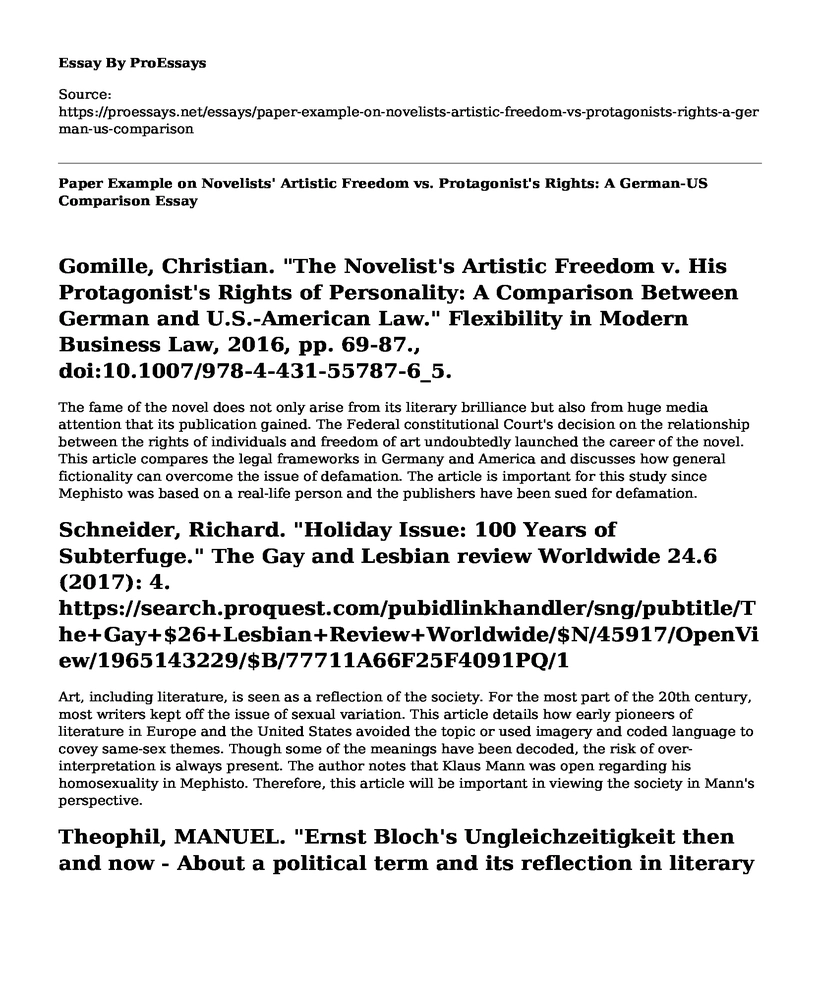Gomille, Christian. "The Novelist's Artistic Freedom v. His Protagonist's Rights of Personality: A Comparison Between German and U.S.-American Law." Flexibility in Modern Business Law, 2016, pp. 69-87., doi:10.1007/978-4-431-55787-6_5.
The fame of the novel does not only arise from its literary brilliance but also from huge media attention that its publication gained. The Federal constitutional Court's decision on the relationship between the rights of individuals and freedom of art undoubtedly launched the career of the novel. This article compares the legal frameworks in Germany and America and discusses how general fictionality can overcome the issue of defamation. The article is important for this study since Mephisto was based on a real-life person and the publishers have been sued for defamation.
Schneider, Richard. "Holiday Issue: 100 Years of Subterfuge." The Gay and Lesbian review Worldwide 24.6 (2017): 4. https://search.proquest.com/pubidlinkhandler/sng/pubtitle/The+Gay+$26+Lesbian+Review+Worldwide/$N/45917/OpenView/1965143229/$B/77711A66F25F4091PQ/1
Art, including literature, is seen as a reflection of the society. For the most part of the 20th century, most writers kept off the issue of sexual variation. This article details how early pioneers of literature in Europe and the United States avoided the topic or used imagery and coded language to covey same-sex themes. Though some of the meanings have been decoded, the risk of over-interpretation is always present. The author notes that Klaus Mann was open regarding his homosexuality in Mephisto. Therefore, this article will be important in viewing the society in Mann's perspective.
Theophil, MANUEL. "Ernst Bloch's Ungleichzeitigkeit then and now - About a political term and its reflection in literary texts of the past and present." Colloquium: New Philologies 3.2 (2018)., doi:10.23963/cnp
This article outlines how the emergence of nationalism influenced literary works both in the past and in the present. The author also examines the effects that the Nazi regime had on the artists. Klaus Mann was affected by the regime in that he had to go into exile at some point of his life. The author also explains the concept of Ungleichzeitigkeit as advanced by Ernst Bloch and argues that it gives rise to soft spots that allow artists more freedom. This is the reason why authors like Klaus Mann were more vocal in their works. This article, therefore, will be useful in determining the influences of various themes in Mephisto.
Works Cited
Gomille, Christian. "The Novelist's Artistic Freedom v. His Protagonist's Rights of Personality: A Comparison Between German and U.S.-American Law." Flexibility in Modern Business Law, 2016, pp. 69-87., doi:10.1007/978-4-431-55787-6_5.
Schneider, Richard. "Holiday Issue: 100 Years of Subterfuge." The Gay and Lesbian review Worldwide 24.6 (2017): 4. https://search.proquest.com/pubidlinkhandler/sng/pubtitle/The+Gay+$26+Lesbian+Review+Worldwide/$N/45917/OpenView/1965143229/$B/77711A66F25F4091PQ/1
Theophil, MANUEL. "Ernst Bloch's Ungleichzeitigkeit then and now - About a political term and its reflection in literary texts of the past and present." Colloquium: New Philologies 3.2 (2018)., doi:10.23963/cnp
Cite this page
Paper Example on Novelists' Artistic Freedom vs. Protagonist's Rights: A German-US Comparison. (2023, Jan 11). Retrieved from https://proessays.net/essays/paper-example-on-novelists-artistic-freedom-vs-protagonists-rights-a-german-us-comparison
If you are the original author of this essay and no longer wish to have it published on the ProEssays website, please click below to request its removal:
- Comparing and Contrasting The Yellow Wallpaper and The Storm Essay
- With the Old Breed by Eugene Sledge: The Mental Cost of War Essay
- King Lear Essay Example
- Essay Example on Prospero's Daughter: Miranda in Shakespeare's 'The Tempest'
- Essay Example on Antigone: A Tale of Clashing Themes and Gender Roles
- Movie Analysis Essay on Realism in Street Car Named Desire
- Essay Example on 3 Poem Types: Theme, Form, Figurative Language







